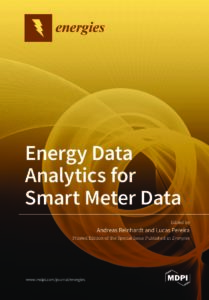Book
Publication Types:

Energy Data Analytics for Smart Meter Data
Preface to ”Energy Data Analytics for Smart Meter Data”
The roll-out of smart electricity meters is a cornerstone for the realization of next-generation electrical power grids. In addition to measuring electrical consumption data at much greater temporal and amplitude resolutions than offered by traditional metering devices, smart meters can communicate collected data to external service providers and thus enable the creation of novel energy data-based services that extend far beyond their usage for billing purposes. These include, but are not limited to, the enablement of ambient-assisted living, generation, and demand forecasting, or the provision of recommendations on how to save energy.
A fundamental research challenge, still unresolved today, is how to fully explore and exploit the information content of smart meter data. This is a challenge pertaining not only to data processing but equally to their collection, transmission, and ensuring the appropriate security and privacy protection.
This book includes twelve research works and two review papers covering the entire lifecycle of smart meter data. The first set of contributions is centered around providing new solutions to the processing of smart meter data. These include innovative approaches for non-intrusive load monitoring (NILM) and the identification of electricity theft, exploiting novel techniques, and partially based on parameters beyond smart meter data alone. These contributions are followed by novel approaches to other data-driven services, including the privacy-preserving collection and synthetic generation of electricity consumption data. Two review papers cover the most up-to-date research efforts in deep learning for NILM, as well as a survey of viable options to streamline the provision of smart meter data applications from a consumer-centric perspective.
